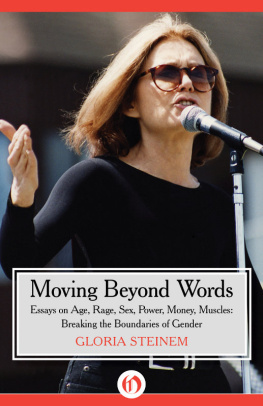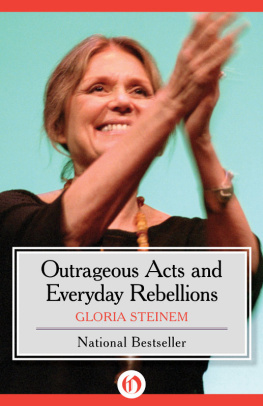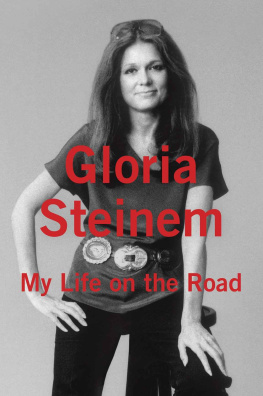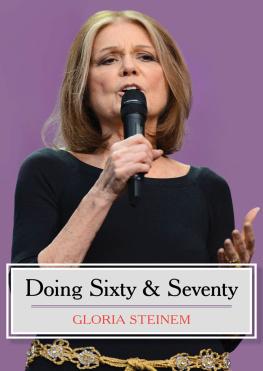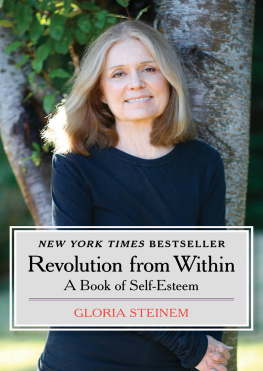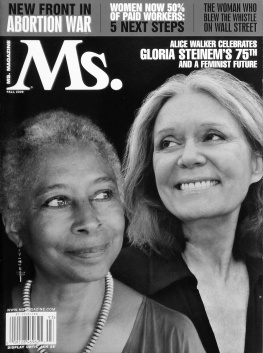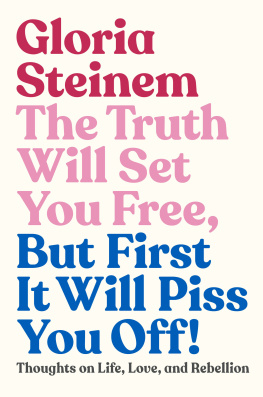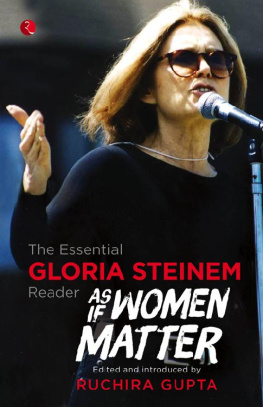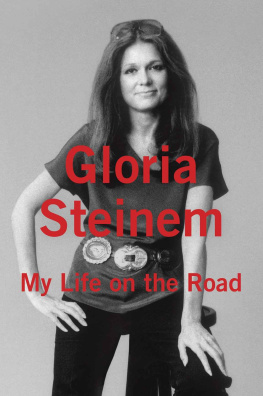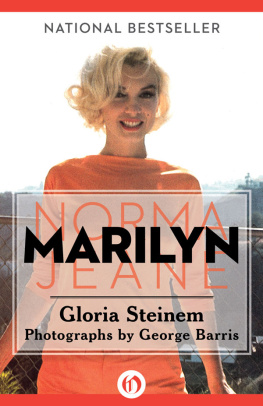
Moving Beyond Words
Age, Rage, Sex, Power, Money, Muscles: Breaking the Boundaries of Gender
Gloria Steinem

FOR MY SISTER
SUSANNE STEINEM PATCH
WITH LOVE, GRATITUDE, AND HOLIDAYS
Contents
Add Water
I WAS HOPING THIS would be an easy book. Having taken a long time with the last one, Revolution from Within, I thought this could be a collection of already published articles. All I would have to do was write a short introduction and a transition or two, and I would have what E. M. Forster called a miscellany of occasional writings and my contemporaries refer to as refrying the beans.
But more than a year later, it has become a book of mostly new writing. Three of its six parts appear here for the first time. Three of them had a seed, seedling, or partly grown plant in a previously published article, but they too have acquired new prefaces along with new ideas and examples within their texts. As a result, each of these six parts has become rather like a condensed book, often with its own introduction. Since there seems to be no genre for this, Ive found myself explaining it this way: If you added water to any of these parts, it would become a book.
To show you how each essay assumed a life of its own, the short introduction became Doing Sixty, which is now the last part of this book. In retrospect, I realize it is the culprit whose energy forced me to deviate from my plan. Not only did it take on a length and independence that refused to introduce anythingexcept perhaps the futurebut it kept inviting me to return to it long after I thought I had finished. Instead of watching previous states of mind jostle against each other and make a different kind of sense together, which is the pleasure of a collection, I found this newer state of mind refusing to take a back seat, and insisting on pushing everything else a little further. Though some of this urge came from the many years I spent more absorbed in activism than writing, which did indeed leave me with an unwritten book in every toe, elbow, and tooth, its content was a practical example of growing more radical with age.
Though I once would have treated Freuds writings as a secular bible, in much the way an atheist debater might try to impress a fundamentalist audience by using biblical references she or he doesnt believe for a minute, this new state of mind insisted on reading Freud in the way all writing deserves: as if we found it in the street and were reading it for any kind of sense, insight, sincerity, or value. Getting rid of the Great Man scrim was a revelation, and the result was both funny and frightening.
When I first interviewed Bev Francis, the strongest woman in the world, I was viewing fitness as personal and Bev as exceptional, but this newer state of mind saw the politics of muscle, and also a history of my own that I hadnt been ready to look at before.
Instead of thinking like an isolated dissident within the medias ranks, as I had been when I first wrote Sex, Lies, and Advertising, I began to see the ways in which people and interests within the current system are also trapped by it, and therefore to glimpse why and how it could be changed.
When I first wrote about women in Americas families of inherited wealth and power, I discovered the masculinization of wealth as the other end of the feminization of povertythat neither could be solved without attacking the other. Though that remains true, my current state of mind has less tolerance for abstractions. I began to imagine what might happen if the strength of women who havent had the restrictive social training to be ladies could be shared with women who could seize control of upper-class resourceson behalf of both.
Instead of expanding a report on womens economic development groups that had been planned for the collection, I began to notice that readers of its proposed table of contents received economics like a sleeping pill, and the phrase economic development with all the enthusiasm usually reserved for a hydroelectric dam. Using my own experience as an economics-impaired person, I tried instead to arrive at a way of demystifying economics, of treating the subject with more enthusiasm and less respect. Now Revaluing Economics is the main event, and the new womens development groups are its postscript.
Nonetheless, I didnt realize my original plan was out the window until I found myself eight months later, surrounded by stacks of Freuds old or newly published writings, books by a new generation of researchers who have begun to investigate instead of simply accepting his case histories, and a growing list of phone numbers of scholars who are looking at the impact of his work rather than his Read this to melt the time between Swifts eighteenth century and todayand to feel even less like excusing Freud with the product of his time argument, remember that Swift wrote it more than a century before Freud was born. While exploring the potential of scholarly footnotes and concocting such words as testyria and androphobia, I began to understand why the great writer Vladimir Nabokov had such a good time doing even the index of Pale Fire.
As I saw Phyllis Freud becoming the longest part of the book, I finally began to relax and enjoy whatever form the rest would take. In the hope that it might have the same effect on you (though its footnotes take some getting used to), I placed it first. I dont know if fury can compete with necessity as the mother of invention, but I recommend it. Once finished, I felt as spent and happy as Bev Francis after a workout.
Of course, the process isnt over. Writing a book is like trying to stop a river. I still worry that putting sixty in the title of the last essay may have the same effect on younger readers that it would have had on me. At their age, my generation regarded people over sixty, or even forty, as another speciesand planned our lives poorly as a result. But I hope this essay will help younger readers to see a long and adventurous life ahead, to worry less about early successes, failures, or advice to settle down (which, as it turns out, we never do), and to regard older people as potential friends and colleagues. I want to thank two friends in their twenties, Amelia Richards and Rebecca Walker, who served as test readers with this goal in mind. Most of all, I hope its helpful to my beloved age peers, in whom I have the greatest faith. If our generation could survive coming of age in the 1950s, we can survive anything.
You may be a better judge than I of what these six disparate parts have in common. In retrospect, I see that theyre all walking around a familiar subject, and looking at it from a different perspective. Another shared image might be opening the other eye. We have for so long looked at most subjects through male eyes that remedial vision (which for women, would mean looking at the world as if women mattered, and for men, as if they were women) brings a new perspective. It may not completely change what has always been before us, but it adds new depth, and a sense of the periphery which, as in a cell or a sprout, is where growth takes place. Even to see the peripheries, as Joanna Russ has reminded us, it seems you have to be on them, or by an act of radical re-vision, place yourself there. All the parts and sub-parts share the structure of the essaythat elastic but still distinct form that invites a writer to begin in a personal place and come to a larger point. Finally, I hope all are accessible, for the older I get, the less patience I have with writing that is designed to keep people out.
Next page
